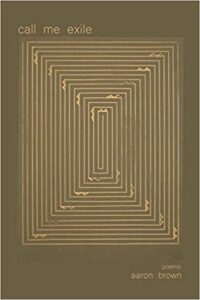Aaron Brown. Call Me Exile. Stephen F. Austin University Press, 2022. 82 pgs. $19.95.
“Exile” is a complicated word weighted with history. When I hear it, I think about war and famine, about Israelites moving into and out of Egypt thousands of years ago and about 21st century Ukrainians, Syrians, and Somalians. In Call Me Exile, his second collection of poetry, Aaron Brown writes of dire international circumstances, and he also writes of much more intimate forms of exile, from one’s self and from others. The book is multi-layered, and the individual poems are well-crafted and emotionally resonant.
“Via Negativa” is an impressively concrete consideration of that most abstract of ideas, a theological concept that suggests God can be understood or experienced only through what God is not. Any image of God is of course not God, yet contemporary American poetry often finds its strength in the concrete image. So the concept of the poem is paradoxical, exploring the abstract by engaging the concrete. The poem contains several examples of what “you are not,” before it turns toward what “you” might be:
You are not the wind scraping branch on pane
or the continental plate strike-slipping beneath
a valley of bones drought-brittled and baked.
You are not hurricane clouds circling around
an ever-turning eye, slow-moving and a mile
wide, surrounding surging sea, framing bound
the heaving-heavens looking down on swirling
earth—nor are you the grass-fire spread before
the rains come cooling brush, keeping
calm what you are not. But maybe you are
somewhere close, not the land but the dust,
not the sea but the wind making waves or
the deep-dark pull of lunar longing, wanting
the vastness between us shrunk to nothing.
As much as I appreciate all of the visual imagery here, I appreciate the sonic effects even more. The frequent alliteration and assonance toward the beginning of the poem are particularly insistent. Some of the language, “framing bound / the heaving-heavens,” for example, evokes Hopkins to my ear, and the rhythm of the poem relies on an abundance of stressed syllables, also akin to Hopkins. At fourteen lines but lacking a regular pattern of rhyme or much iambic pentameter, the poem is not strictly a sonnet, but it is sonnet-adjacent. Most crucially, it turns at line ten, from negativa to possibility. The imagery in these last few lines remains consistent with earlier references to meteorology, but the final couplet surprises with its acknowledgment of desire: “the deep-dark pull of lunar longing, wanting / the vastness between us shrunk to nothing.” The harsh sounds that were so common earlier have softened, which slows the rhythm down a bit, especially with the repeated “l” in “pull of lunar longing,” and following “longing” with “wanting” emphasizes that need. Concluding the poem with the word “nothing” returns us to its title, but here what we have is not negativa but connection. In a lesser poem, this choice would be simply clever, but here “nothing” provides a final click, locking its meaning into place. It’s strangely satisfying.
The title poem, “Call Me Exile,” is also addressed to a “you,” but in this poem the “you” seems to be a stand-in for the speaker, a disguised “I.” It is arranged into three sections, each comprised of multiple couplets. In each section, the “you” arrives in a strange place, challenged by physical discomfort and psychological confusion. In the first section, he’s dropped off from a taxi in freezing Amman, where inside feels as cold as outside. In the second section, the “you” travels from one desert to another, finding himself caught between combatants, where “what fell around you was not snow, but shells.” Finally, in the third section, the “you” seems to have arrived in a safer place, if any place can be confidently experienced as safe:
Where are you now? What sand-scraped street
winters in your mind? When you go out
during night’s deadest hours, sky so crisp
the constellations open up to you, do you
remember the way each winter was its own struggle
for breath to come warmly,
for breath to be stilled? Like waking, thinking
for a second you are back—
an uncanny second when you mistake
morning birds for bombs.
Here, the description of cold is much more attractive than it had been in the first section. The you, apparently out of danger, experiences the universe as seeking to connect: “sky so crisp / the constellations open up to you…” Yet the opening question reveals how chronically unsettled the “you” feels, and the final couplet exposes the long-term effects of trauma: “you mistake / morning birds for bombs.”
“Call Me Exile” depends less on concrete imagery and figurative language than “Via Negativa” does, demonstrating once again the symbiotic relationship between form and content. The content of “Call Me Exile” is so intense, so unbelievable to those of us who have led lives of relative safety, that metaphor could easily become a distraction. In “Call Me Exile,” Brown’s narration is direct. Although the reader doesn’t struggle to comprehend the language, many of us will struggle to comprehend the experience. Brown permits us to feel horror, and that horror arouses empathy. Brown’s skill with craft guarantees that readers will cycle through several emotions while reading this poem, and that particular experience of reading will make the poem memorable.
Other poems describe additional moments of grief and loss—there’s a lot of sorrow in this book. Most readers, I suspect, will read it slowly because so many of the poems demand significant emotional engagement. Yet as filled with sorrow as this book is, it is not filled with despair. I won’t go so far as to claim that it is filled with hope, but it does conclude with a recognition that trauma doesn’t always have the last word, for as the last poem asserts in its title, citing St. Benedict, “Always We Begin Again.”

